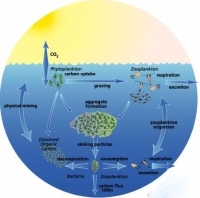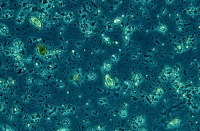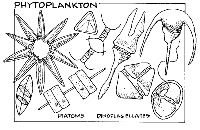|
|
|
|
|
|
|
 |
Phytoplankton - Indicator Of Change |
 |
Phytoplankton are the components of the plankton community that obtain energy through a process called photosynthesis and must therefore live in the well-lit surface layer of an ocean, sea, lake, or other body of water. The name comes from the Greek words phyton, or "plant", and planktos, meaning "wanderer" or "drifter". Most phytoplankton are too small to be individually seen, however, when present in high enough numbers, they may appear as a green discoloration of the water due to the presence of chlorophyll within their cells.
Through photosynthesis, phytoplankton are responsible for much of the oxygen present in the Earth's atmosphere – half of the total amount produced by all plant life. Their cumulative energy is the basis for the vast majority of oceanic and also many freshwater food chains. As one of the more remarkable food chains in the ocean, phytoplankton is fed on by krill (a type of shrimp) fed on by baleen whales. Zooplankton, a major component of coral, also eats phytoplankton. 
The larger the world's phytoplankton population, the more carbon dioxide gets pulled from the atmosphere, hence, the lower the average temperature due to lower volumes of this greenhouse gas. Scientists have found that a given population of phytoplankton can double its numbers on the order of once per day. Populations of this marine plant will grow or diminish rapidly in response to changes in its environment, alerting scientists that environmental conditions are changing. Large populations of this organism, sustained over long periods of time, could significantly lower atmospheric carbon dioxide levels and, in turn, lower average temperatures.
Vanishing Arctic sea ice brought on by climate change is causing the crucially important microscopic marine plants called phytoplankton to bloom explosively and die away as never before, a phenomenon that is likely to create havoc among migratory creatures that rely on the ocean for food. A few organisms may benefit from this disruption of the Arctic's fragile ecology, but a variety of animals, from gray whales to seabirds, will suffer. If migratory animals reach the Arctic and find the phytoplankton's gone, they will die. Phytoplankton throughout the world's oceans is the crucial nutrient at the base of the food web on which all marine life depends; when it's plentiful, life thrives and when it's gone, marine life is impossible.
 With 10 years of observations from six NASA satellites to study changes in the evidence of chlorophyll at the surface of the oceans is a key to measuring the annual abundance and disappearance of phytoplankton blooms. The satellite network has also recorded the yearly appearance and disappearance of vast expanses of sea ice and the increasing areas of open ocean all around the Arctic, an indication of how climate change is taking hold in the northern reaches of the globe. With 10 years of observations from six NASA satellites to study changes in the evidence of chlorophyll at the surface of the oceans is a key to measuring the annual abundance and disappearance of phytoplankton blooms. The satellite network has also recorded the yearly appearance and disappearance of vast expanses of sea ice and the increasing areas of open ocean all around the Arctic, an indication of how climate change is taking hold in the northern reaches of the globe.
 The annual deep freeze that has covered much of the northern seas with ice around the polar regions was once a regular event, but what has been normal for millennia in the High Arctic is no longer the case. As global climate change has warmed the world's oceans, warmer water has moved into the frigid Arctic, causing changes in the once-regular appearance and disappearance of sea ice over vast areas. The result is a shift in when explosive blooms of phytoplankton appear and disappear. As changes in ice cover throw the timing of phytoplankton abundance off, then the birds and animals whose brains have long been programmed to migrate north at specific times of the year will have no nourishment when they get there. Every spring and summer, phytoplankton in the Arctic blooms richly in explosive pulses, nourished by nitrogen and phosphorous in the seawater, and when those chemicals are consumed, the blooms end. The summer of 2007 experienced by far the lowest sea ice cover ever recorded, an unprecedented 23 percent lower than the previous low recorded only two years earlier. The annual deep freeze that has covered much of the northern seas with ice around the polar regions was once a regular event, but what has been normal for millennia in the High Arctic is no longer the case. As global climate change has warmed the world's oceans, warmer water has moved into the frigid Arctic, causing changes in the once-regular appearance and disappearance of sea ice over vast areas. The result is a shift in when explosive blooms of phytoplankton appear and disappear. As changes in ice cover throw the timing of phytoplankton abundance off, then the birds and animals whose brains have long been programmed to migrate north at specific times of the year will have no nourishment when they get there. Every spring and summer, phytoplankton in the Arctic blooms richly in explosive pulses, nourished by nitrogen and phosphorous in the seawater, and when those chemicals are consumed, the blooms end. The summer of 2007 experienced by far the lowest sea ice cover ever recorded, an unprecedented 23 percent lower than the previous low recorded only two years earlier.
Most of the explosive increase in plant production was due to the longer growing season made possible by the increasing extent of ice-free open ocean, particularly in the shallower waters of the continental shelves that surround the entire north polar region. Plankton is short-lived, and when its chemical nutrients run out and the plants disappear, the marine life that depends on it is threatened. Continued reductions in Arctic sea ice and the associated increase in primary production of phytoplankton are almost certain to impact marine ecosystems and could precipitate profound ecological shifts.
|
|
Incredible Diving & Snorkeling Adventures
|
|
|
 Atlantis Submarines Cozumel Adventure Atlantis Submarines Cozumel Adventure |
Don't even get wet but dive to depths of 100 feet in a REAL submarine piloted by a professional and licensed crew and experience why Cozumel remains one of the top dive destinations in the world.
US $105 Adults / US $65 Kids
|
 |
 Cozumel Isla de Pasion Trip Charters Cozumel Isla de Pasion Trip Charters |
Take a relaxing cruise aboard our Charter boats across the crystal clear waters of Cozumel to beautiful and remote Isla de Pasion. Passion Island is Cozumel's own little island!
US $ 75 Per Person / $500 Min. Private Charter
|
 |
 Cozumel Dive Paradise Dive Trips Cozumel Dive Paradise Dive Trips |
Experience the thrill of scuba diving in one of the top dive destinations in the world with Cozumel's leading dive shop ~ Dive Paradise!
Per Person US $35 (1 Tank) to US $79 (2 Tanks)
|
 |
 Cozumel ~ Dive Paradise ~ Dive Instruction Cozumel ~ Dive Paradise ~ Dive Instruction |
Experience the thrill of learning to scuba dive in one of the top dive destinations in the world with Cozumel's leading dive shop ~ Dive Paradise!
Starting at Only US $ 56 Per Person
|
 |
 Cozumel Island Map & Reef Creature Identification Cards Cozumel Island Map & Reef Creature Identification Cards |
Beautifully drawn and virtually indestructible Franko Cozumel Map and Franko Fish Identification Cards showing lots of detail including beaches, reefs, streets and landmarks!
Maps and Identification Cards from US$ 4.95
|
 |
 Snuba Cozumel ~ Combination Snorkel/Scuba from Shore Snuba Cozumel ~ Combination Snorkel/Scuba from Shore |
Snuba is a combination of snorkeling and scuba diving, it is a way to explore the under water world without the cumbersome equipment required for Scuba diving and without the surface limitations associated with snorkeling.
$59/person
|
 |
|
|
 |
 |
|
|
|
 |
Copyright 2000 - 2024 Sherri Davis, All Rights Reserved. Contributors retain the copyright to their work. Please do not take art or written content without permission. Other graphics and reference materials are used and attributed as per the Fair Use Provision of The Copyright Act and individual terms of use.
|
 |



















